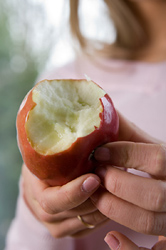Do you suffer from hay fever or other seasonal allergies yet find that when you eat certain fresh fruits and vegetables, you get a strange, tingly, itchy sensation in your mouth?
 For some people with pollen allergies, taking a bite of an apple or other fresh fruits and veggies can cause an allergic reaction that makes their mouth tingle and itch. |
If so, you could have food-pollen allergy syndrome, also known as oral allergy syndrome.
Evidence suggests that in some people with seasonal allergies, their immune system mistakes a plant protein in certain fruits and vegetables for pollen, resulting in sometimes strange symptoms like:
- Itching in your mouth, lips and back of throat
- Tingling in your mouth
- An itchy tongue
- Throat and lips that feel swollen
"They're not identical proteins, but they're similar enough to confuse the immune system to have these reactions," Dr. Robert Wood, chief of pediatric allergy and immunology at Johns Hopkins Children's Center, told CNN.
Allergy specialists call this a “cross-reaction,” and say that about 25 percent of people with a pollen allergy may suffer from food-pollen syndrome. However, many who experience are completely unaware that their itchy mouth upon eating an apple or cantaloupe has to do with their seasonal allergies.
Food-Pollen Syndrome is NOT a Food Allergy
In the case of a food allergy, you are allergic to a protein in a food, such as peanuts, and the corresponding immune system reaction impacts your whole body.
With food-pollen syndrome, however, your allergy is to pollen. It’s only when you eat a food with a similar protein structure to pollen that you have a reaction, and the reaction is short-term and confined to your mouth and throat because the offending plant proteins cannot survive the acids and enzymes in your digestive system. Only in rare cases will food-pollen syndrome lead to anaphylaxis, with can cause blocked airways and high blood pressure, and may be life-threatening.
There are two ways to determine if your allergy symptoms are due to food-pollen syndrome:
- The symptoms are confined to your mouth, lips and throat, and they go away in 10-30 minutes
- You only have the problem when you eat raw fruits and vegetables, as opposed to cooked versions (cooking appears to destroy or inactivate the allergic proteins)
Which Foods are Cross-Reactive to Which Allergies?
According to the Mayo Clinic, if you’re allergic to birch pollen, you may also have a reaction to:
- Apples
- Carrots
- Celery
- Hazelnuts
- Peaches
- Pears
- Raw Potatoes
If you’re allergic to ragweed pollen, you may react to:
- Bananas
- Melons (cantaloupe, honeydew and watermelon)
- Tomatoes
If you’re allergic to grasses, you may react to:
- Kiwis
- Tomatoes
If you’re allergic to mugwort pollen, you may react to:
- Apples
- Carrots
- Celery
- Kiwis
- Peanuts
- Certain spices (caraway seeds, parsley, coriander, anise seeds, fennel seeds)
How to Cope With Food-Pollen Syndrome
Remember, not everyone with a seasonal allergy experiences food-pollen syndrome, but if you do cooking fruits and vegetables can help you avoid a reaction. If your symptoms are confined to your mouth and you don’t want to give up on raw produce, either for the taste or the health benefits, you don’t have to.
"Patients will typically decide on their own, without any discussion with a doctor, whether they enjoy the apple [or other offending food] enough to put up with an itchy mouth, or whether they hate the itchy mouth enough to avoid the apple," Dr. Wood said on CNN.com.
There are other tricks, too, that can help to reduce your food-pollen syndrome symptoms:
- Try removing the peel from the fruit or vegetable
- Opt for freshly picked varieties (storing foods increases the amount of allergen)
- Try a different variety of the food
- Rinse your mouth with water after you eat the offending food
You may also notice that you only react to raw fruits and vegetables during the season your pollen allergy is most active. In fact, typically as your pollen allergy improves, so will food-pollen syndrome. Fortunately, there are numerous ways to keep seasonal allergies from interfering with your health, and we’ve listed some of the top ones below.
Click here for the rest of the article and 10 Simple Ways to Fight Seasonal Allergies
Is your child have a food allergy, did you know that Food allergies among children have risen 18 percent from 1997 to 2007, causing more than a few raised eyebrows among researchers and health officials. The first federal study of the issue found that one in 26 children now have food allergies, compared to one in 29 in 1997. Click Here to read more.
No comments:
Post a Comment